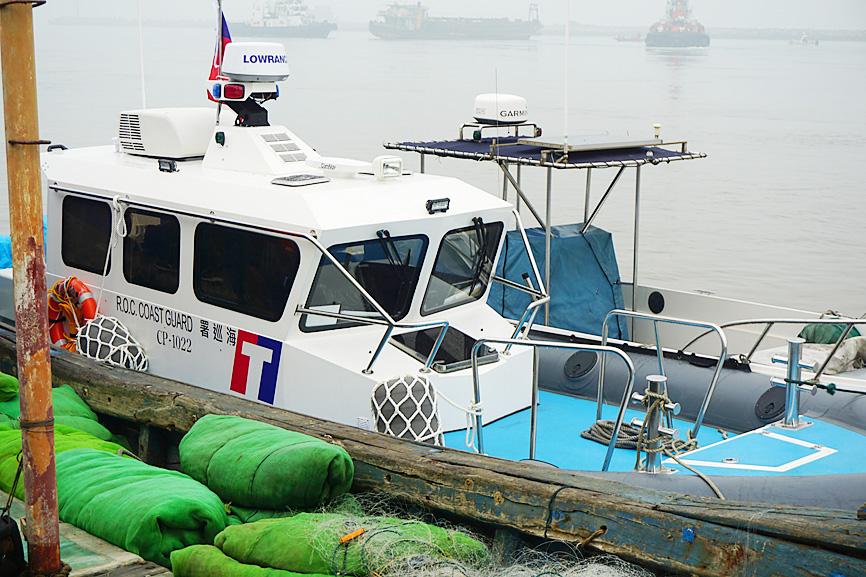Taiwan’s newest Coast Guard Administration (CGA) patrol vessel was damaged after being rammed by Chinese fishing boats near Kinmen County.
It was the second confrontation this month in which shots were fired to repel Chinese fishing boats.
Chen Chien-wen (陳建文), chief of the coast guard’s Offshore Flotilla No. 9 unit for Kinmen County, said that on Monday a dozen Chinese fishing boats entered Taiwan’s territorial waters near Little Kinmen (小金門), also known as Lieyu (烈嶼), close to the coast of China’s Fujian Province.

Photo: CNA
“We are happy to report that no coast guard personnel were hurt in the incident, but the new CGA patrol cutter, CP-1022, was rammed and had its hull damaged,” Chen said on Thursday.
The coast guard is to request that Chinese authorities launch an investigation to find the perpetrators and demand financial compensation from them, Chen said.
Touted as the newest addition to Taiwan’s coast guard, the offshore patrol cutter had just joined the Kinmen Island unit on Saturday last week.
On its first mission on Monday, the CP-1022 was accompanied by two other vessels — coast guard cutter PP-2006 and a patrol boat belonging to the Kinmen County Government’s Fisheries Research Institute — to patrol the waters around Kinmen to deter Chinese vessels from intruding in Taiwan’s waters, as well as illicit fishing and smuggling activities.
The three vessels were clearing illegal fishing nets off Little Kinmen when about a dozen Chinese fishing boats sped toward them, and their crew began throwing rocks and empty alcohol bottles at Taiwanese coast guard personnel, Chen said.
“Then several Chinese fishing boats concentrated their attack on the CP-1022 cutter, and took turns to ram it,” Chen said. “It became a very dangerous situation, so coast guard personnel decided to fire nonlethal ordnance to repel the Chinese boats.”
The non-lethal ordnance included six stun grenades and five bean-bag rounds, he said.
The CP-1022 cost NT$6.6 million (US$217,807), Chen said, adding that the damage to its hull and two outboard motors is estimated to cost at least NT$1.2 million to repair.
The patrol cutter is 11.86m long and 3.4m wide, and has a maximum speed of 45 knots and a range of 288 nautical miles, the CGA said.
It was the second time this month that a Chinese fishing fleet has intruded into Taiwan’s territorial waters near Kinmen.
On March 1, three coast guard cutters faced about 10 Chinese fishing boats near Little Kinmen, coast guard officials said.
In that incident, coast guard personnel fired pellets from their Benelli semiautomatic shotgun, officials said.
The coast guard vessels involved included a cutter (PP-3552), and two patrol boats (CP-1020 and CP-1018), which were responding to calls to clear up illegal netting, officials said.

POSITIVE DEVELOPMENT: Japan and the US are expected to hold in-depth discussions on Taiwan-related issues during the meeting next month, Japanese sources said The holding of a Japan-US leaders’ meeting ahead of US President Donald Trump’s visit to China is positive news for Taiwan, former Japan-Taiwan Exchange Association representative Hiroyasu Izumi said yesterday. After the Liberal Democratic Party’s landslide victory in Japan’s House of Representatives election, Japanese Prime Minister Sanae Takaichi is scheduled to visit the US next month, where she is to meet with Trump ahead of the US president’s planned visit to China from March 31 to April 2 for a meeting with Chinese President Xi Jinping (習近平). Japan and the US are expected to hold in-depth discussions on Taiwan-related issues during the

‘LIKE-MINDED PARTNER’: Tako van Popta said it would be inappropriate to delay signing the deal with Taiwan because of China, adding he would promote the issue Canadian senators have stressed Taiwan’s importance for international trade and expressed enthusiasm for ensuring the Taiwan-Canada trade cooperation framework agreement is implemented this year. Representative to Canada Harry Tseng (曾厚仁) in an interview with the Central News Agency (CNA) said he was increasingly uneasy about Ottawa’s delays in signing the agreement, especially as Ottawa has warmed toward Beijing. There are “no negotiations left. Not only [is it] initialed, we have three versions of the text ready: English, French and Mandarin,” Tseng said. “That tells you how close we are to the final signature.” Tseng said that he hoped Canadian Prime Minister Mark Carney

President William Lai (賴清德) yesterday bestowed one of Taiwan’s highest honors on Saint Vincent and the Grenadines (SVG) Ambassador Andrea Clare Bowman in recognition of her contributions to bilateral ties. “By conferring the Order of Brilliant Star with Grand Cordon on Ambassador Bowman today, I want to sincerely thank her, on behalf of the Taiwanese people, for her outstanding contribution to deepening diplomatic ties between Taiwan and SVG,” Lai said at a ceremony held at the Presidential Office in Taipei. He noted that Bowman became SVG’s first ambassador to Taiwan in 2019 and

A man walks past elementary school artworks at the Taipei Lantern Festival in Ximen District yesterday, the first day of the event. The festival is to run from 5pm to 10pm through March 15.